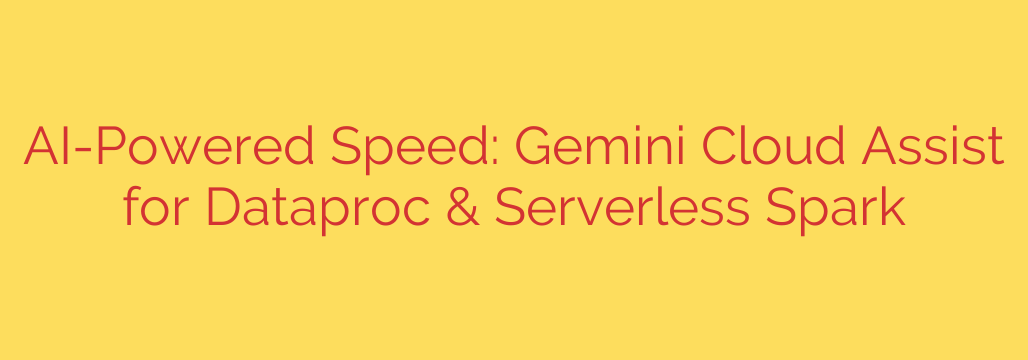
AI-Powered Optimization: A Deep Dive into Gemini for Dataproc and Serverless Spark
Apache Spark is a powerhouse for big data processing, but harnessing its full potential often requires deep expertise. From configuring clusters for optimal performance to deciphering cryptic error messages, data engineers face significant challenges that can slow down development and inflate costs. Now, a new era of intelligent assistance is transforming how we interact with Spark on the cloud.
By integrating powerful generative AI directly into data platforms like Dataproc and Serverless Spark, developers can now streamline their workflows, accelerate troubleshooting, and unlock unprecedented levels of efficiency. This AI-powered collaboration acts as an expert partner, helping both novices and seasoned professionals build, optimize, and debug their data pipelines more effectively than ever before.
Revolutionizing Spark Performance Tuning
One of the most time-consuming aspects of managing Spark workloads is performance tuning. Identifying the right cluster configurations, optimizing memory allocation, and rewriting inefficient code is a complex, iterative process.
AI assistance automates much of this heavy lifting. By analyzing your Spark code and job execution plans, the system can provide context-aware suggestions to boost performance.
Key benefits include:
- Intelligent Configuration Suggestions: The assistant can recommend optimal machine types, cluster sizes, and specific Spark properties tailored to your job’s unique requirements. This eliminates guesswork and prevents over-provisioning.
- Code-Level Optimizations: It pinpoints inefficient operations within your PySpark, SQL, or Scala code and suggests more performant alternatives, helping you write better, faster code from the start.
- Cost Reduction: By ensuring jobs run faster and use resources more efficiently, organizations can dramatically reduce their cloud computing costs and improve the overall ROI of their data infrastructure.
Demystifying Errors: Intelligent Debugging and Troubleshooting
Every data engineer has spent hours staring at a long, convoluted Java stack trace, trying to pinpoint the root cause of a failed Spark job. AI-powered diagnostics change this frustrating experience entirely.
When a job fails, the integrated assistant doesn’t just show you the raw error log. Instead, it analyzes the error in context and provides a clear, human-readable explanation of what went wrong. More importantly, it offers actionable steps and code snippets to fix the problem. This capability transforms debugging from a reactive chore into a proactive learning experience, slashing problem resolution time from hours to minutes.
Accelerating Development with AI-Powered Code Generation
Getting started with a new data pipeline or translating business logic into Spark code can be a major hurdle. Generative AI lowers this barrier significantly by assisting with code creation and conversion.
You can now use natural language prompts to generate boilerplate code, create complex data transformations, or even translate queries from one language to another. For example, you can simply ask the assistant to “convert this SQL query into an equivalent PySpark DataFrame operation,” and it will generate the necessary code instantly. This not only boosts developer productivity but also makes Spark more accessible to a wider range of users, including data analysts and scientists who may not be programming experts.
Actionable Security and Best Practices
While leveraging AI for Spark optimization is a powerful advancement, it’s crucial to follow best practices to ensure security and reliability.
- Always Review AI Suggestions: Treat AI-generated code and configurations as expert recommendations, not infallible commands. Always review and test suggestions in a non-production environment before deploying them.
- Implement Least Privilege: Ensure that the service accounts and user permissions associated with your Dataproc and Spark workloads follow the principle of least privilege. Grant only the permissions necessary for the job to run.
- Be Mindful of Sensitive Data: When using the natural language interface to ask for help, avoid including proprietary information, personal data (PII), or other sensitive details in your prompts.
The Future of Data Engineering is Collaborative
The integration of advanced AI into platforms like Dataproc and Serverless Spark marks a significant leap forward. It moves beyond simple code completion to offer a truly collaborative partnership that helps engineers work smarter, not harder. By automating complex tuning tasks, simplifying debugging, and accelerating development, this technology is empowering data teams to focus on what truly matters: deriving value from their data.
Source: https://cloud.google.com/blog/products/data-analytics/troubleshoot-apache-spark-on-dataproc-with-gemini-cloud-assist-ai/








